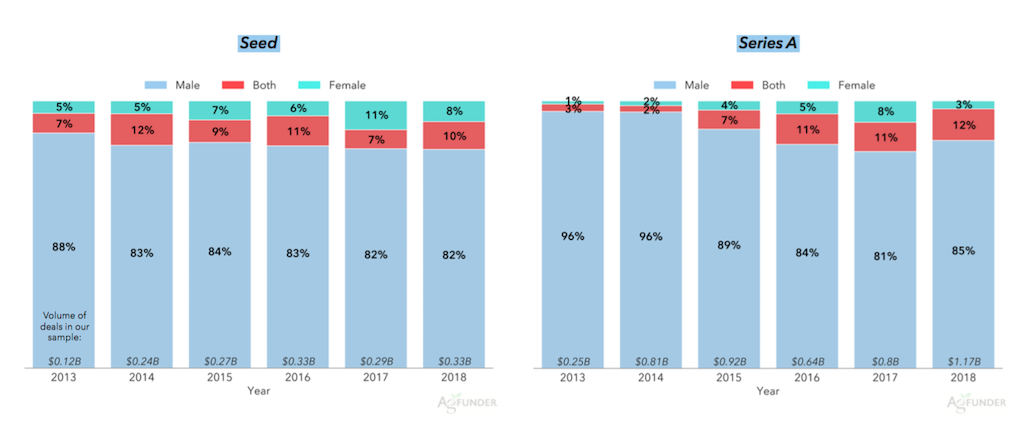7 Mins Read
Unfortunately, new (and old) research is pointing to the fact that even in the most progressive industries of today – such as the booming food-tech sector working on sustainable solutions for global food insecurity – companies are still sticking to the gender unequal status quo. Data has consistently shown that from leadership positions, pay gap and investments, women are systematically losing out. What’s more puzzling is that women are profitable. They have a unique understanding of consumer bases that typically respond the best to the most progressive causes. Women have shown to reap in huge rewards for companies that do care about equality and have made changes. It begs the question of whether the success of some of the most innovative, front-of-the-pack and popular startups we’re seeing today are still shrouded in injustice. Just because these guys are in t-shirts rather than suits, and are talking about veganism and recycling, are they exempt from being complicit in structural inequality? Isn’t it just the same system reincarnated in a new glossy and trendy sector?
The Data
Ok, let’s take a look at the facts. According to a Carta analysis involving nearly 10,000 startups, female founders hold much less equity in their companies than their male counterparts. Women represent a mere 13% amongst startup founders, but their equity value stats are even worse: just 7%. Employee wise, women make up 34% of startup staff but only hold 20% of employee equity wealth. Plus, the most successful startups valued over US$1 billion (those dubbed “unicorns”) – such as Airbnb, Stripe, Impossible Foods – have all been started by men.

More scary stats, this time revealed by a 2019 report by AgFunder, Karen Karp & Partners, The New Food Economy and S2G Ventures shows that the food-tech startup industry does not buck the trend when it comes to gender inequality (though it’s worth noting that in Asia, of the 20 foodtech startups that have sprouted up, 4 are founded or co-founded by women and one of them broke the record for largest funding round in the industry).
Female startup founders face more pessimistic funding questions and smaller investments than male founders in the industry. “Smaller investments” doesn’t even cut it to describe the tiny fraction of 7% of food-tech deals and 3% of dollars invested that have been secured by female-founded companies.
If we include also those companies that have at least one female founder, the number is bumped up to a mere 16% of deal and 5% of investment dollars. What is actually astonishing is that we’re seeing a worsening trend: funding for startups in their sample of companies with at least one female founder dropped 37% between 2017 and 2018.
But Why?
Some might think that women facing structural inequality in the workplace is something of decades ago, but this could not be further from the truth. When we talk about workplace gender inequality, some might think of the stereotypically masculine financial sector. Perhaps images of dominant angry men in suits intimidating frail women is what crosses minds. But just because newer, glossier, socially progressive young companies are wearing casual Ts and jeans, are they really that different from the status quo?
We’ve already seen this in the internet era with the rise of Silicon Valley tech dudes who overtly call themselves feminists but whose company practices are quite the opposite. Take Google, for instance, are still reeling from the 2017 scandal when an anti-women 10-page memo penned by a male employee became publicly circulated. Uber’s gender bias, from discriminatory management practices, poor HR support and sexual harassment also made headlines the same year.
And guess what, the food-tech industry is no different. Despite marketing themselves as the latest, hottest, most “disruptive” and environmentally woke crowd amongst the startup world, they just seem to be the up-and-coming replacers of long-standing gender injustices, stereotypes and prejudices that have been deeply embedded into society from macro power structures to individual psychologies.
It is these very biases that have pervaded into investors, which is currently hitting food-tech enterprises led by women. In a joint study by Harvard and Columbia University, researchers found that venture capital firms ask men and women different questions during the vetting process. While women entrepreneurs are asked about potential losses and subjected to other pessimistic inquiries to prove their revenue numbers, men receive questions focused on ideals, hopes and potential gains.
As Dr. Dana Kanze, Assistant Professor at the London Business School voiced out in a 2019 Microsoft-sponsored report on Women in the VC Ecosystem, while the number of women founding companies is growing, these female founders are continue to struggle to capitalise on their companies – “even when they demonstrate comparable growth prospects and demand for capital” – because of these very inequalities and biases that prevent them from getting the necessary funding to scale-up.
Some Are Fighting It
The issue has garnered more attention in recent years, which has raised the eyebrows of (very) few leaders. Melinda Gates, for instance, had recently announced a pledge to invest US$1 billion to promote women’s empowerment. A number of governments, such as those in India, California and certain EU countries have also taken some strides to push for more female representation in companies’ boardrooms.
Perhaps one of the best examples of corporate leadership on this issue is Salesforce CEO Marc Benioff, who wrote in an excerpt in his new book about his struggle with gender pay disparities within his own company. Horrified about the “glaring differences scattered throughout every division, department, and geographical region,” Benioff rolled out a series of programs totalling US$8.7 million in spending.
Women Are Profitable
What Benioff quickly realised was that it “paid off in incalculable ways, and its benefits will continue to accrue for years,” citing gains in international recognition for responsible leadership and Salesforce’s ability to recruit the “best and brightest talents”.

If we focus on some of the aspects that food-tech startups are missing out on if they don’t work on improving gender inequality, an easy first pointer is excluding the opinions and direction of the very people who are best placed to lead innovation in a market sector centred on climate change and global health challenges.
In a Yale study, female public opinion consistently perceives of environmental issues such as global warming and biodiversity loss as more urgent and worrying than their male counterparts. This means that women make up a larger share of the very consumer base that these food-tech startups are targeting, and losing out from the leadership of women in their boardrooms will ultimately dampen innovation and the effectiveness of marketing.
So investors, whose biases have been preventing food-tech female founders and CEOs from accessing the necessary capital funding for growth are leaving behind a huge opportunity. Prevailing biases are keeping shut an untapped resource.
Other research findings have also supported that addressing gender biases in the boardroom would bring profits. Several analyses, amalgamated in report by Harvard Business Review has shown that more women in leadership board positions yield better acquisition and investment decisions and encourages less aggressive risk-taking that is beneficial for shareholders.
This happens because female directors are able to create greater diversity of perspectives which improves discussion quality and dampens the chances of overconfidence – a phenomenon more prevalent amongst male CEOs, which leads to overestimation of returns while under-predicting risk. Bottom line: women promote better overall decision-making.
Beyond Profits

To bring this back into the sustainability conversation, this means that the prevailing gender bias that exists in the food-tech sector is preventing more innovation and solutions to fight our global planetary food system crisis that drives climate change. In Asia, we’re already seeing some of the destructive impacts of climate change underway with the region lagging badly behind on Paris Agreement commitments and even regressing on targets in terms of the Global Goals (SDGs).
As we have previously spotlighted, SDG Goal 5 – women’s empowerment and gender equality – is a crucial target that is being neglected. Women, as stakeholders, decision-makers and educators, have unique insights into real effective solutions, prompted by their current position as a population most vulnerable to climate change amongst other inequalities.
As global consultancy firm McKinsey outlined in a report, advancing women’s equality by elevating their economic role in line with men’s would bring in an extra US$28 trillion to the annual global GDP by 2050, which could be used to finance necessary climate action projects. Women hold the potential to create cascading effects on the achievement of other goals, for the people and our planet.
Lead image courtesy of iStock photo.




